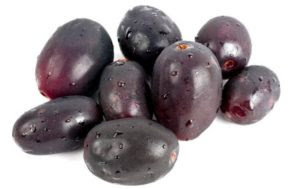Medicinal Properties of Java Plum
Syzygium
Cumini or Black Plum is also known as Java-Plum, jambul, jambolan, jamblang or jamun. Jamun
or Black plum is an important summer fruit, associated with many health and
medicinal benefits. The black plum is known to relieve stomach pain,
carminative, anti-scorbutic and diuretic. Jamun vinegar is good to reduce
enlargement of spleen, diarrhea, and who has urine retention problems.
Jamum’s
ployphenolic compounds are effective against cancer, heart diseases, diabetes,
asthma and arthritis. Various digestive disorders i.e. flatulence, bowel spasm,
stomach disorders, dysentery are cured by jamun. It is also eaten as tonic to
increase sexual activity. Jamun is known by different names such as jambul,
jambas, jamun, jambolan, rajaman, kala jamun, neredu, naval, nerale, jamali,
java plum, black plum and black berry.
Health
Benefits of Jamun/Jambul
1.
Jamun is known to
be an effective treatment for diabetes. Extracts of bark, leaves and seeds are
used in combination with herbs to reduce levels of glycosuria and blood sugar.
Powder of dried seeds is consumed with honey over a course of 2 months for beneficial
changes in sugar levels. Research indicates Jamun seeds which are rich in
alkaloids have hypoglycemic properties effective in reducing high blood sugar.
Jamun juice should be included in a diabetic’s nutritional diet.
2.
Bark of Jamun
tree has antihelmintic properties, which help in treating urinary disorders. A
glass of Jambul juice with 1/2 teaspoon of bark powder daily is recommended for
persons with urinary infections and urinary tract disorders.
3.
Bark powder mixed
with water is effective in curing tapeworm infection.
4.
Consumption of
Jamun minimizes the risk of cancer. This fruit has several bioactive
phytochemicals that include polyphenols, which contain anthocyanin known to
fight cancer cells. Individuals that undergo chemotherapy or radiation sessions
benefit significantly from jamun juice consumption. Anthocyanins, flavonoids,
ellagic acid and gallic acid present in jambul have the capacity to prevent
carcinogenesis in organs.
5.
Jamun juice is
excellent for natural bowel movement.
6.
Jamun has
medicinal properties. Juice of this fruit is a natural astringent used as a
mouthwash as it eliminates bad breath. Pulp of jambul is used as a treatment
for gingivitis (bleeding gums). In some Asian cultures leaves of jamun tree are
burnt to form an ash. This ash is rubbed on teeth to strengthen them.
7.
Leaves and bark
of jamun are used in combination with other ingredients by Ayurveda and Unani
practitioners for various treatments such as diarrhea and indigestion.
Traditional healers in Asia use seed, leaf and bark powder of Jambul tree is
several herbal formulations.
8.
Jamun seed powder
and turmeric is mixed with jamun juice and applied on skin to get rid of
blemishes and light scars.
9.
Jambul juice with
powder of its leaves is an excellent treatment for ulcerative colitis.
10.
Regular
consumption of jambul for 2 to 4 months helps individuals with problems of
bleeding hemorrhoids significantly.
11.
Jamun is known to
enrich blood and also protect from liver damage. Many herbalists recommend
juice of this fruit with herbs because it has antioxidants and flavonoids that
play a huge role in purification of blood. Natural acids present in this fruit
play a pivotal role in digestive enzyme secretion. Regular intake of jambul
stimulates healthy liver function.
12.
Decoction of
jamun seeds that contains aromatic herbs is an excellent home remedy to relieve
fatigue and strain.
13.
Wine and vinegar
made from jamun is used as a cure for sore throat, whooping cough, cuts,
bruises, and open wounds.
14.
Seed powder is
used as a cure for digestive disorders, an excellent home remedy for bloating.
Powder of seeds in jamun juice is excellent for individuals with a suppressed
immune system.
15.
Fruit pulp of
jambul is used as a home remedy for asthma and chronic cough.
Jamun
is a rich source of nutrition. 3-4 calories are present in a medium sized
jambul. As the calorie content is low, this makes an ideal fruit snack for
individuals that want to maintain weight or are on a weight loss diet. Loaded
with vitamins and minerals, this fruit is an essential of several diet plans
recommended by nutritionists and dieticians. Nutritional value of Jamun is
given below.
Java-plum or Jambolan (Raw)
|
|||
Carbohydrate Factor: 3.6 Fat Factor: 8.37
Protein Factor: 3.36 Nitrogen to Protein Conversion Factor: 6.25
|
|||
Refuse: 19% Refuse Description: Seed
|
|||
Nutrient (Proximates)
|
Unit
|
per
100 g
|
|
Water
|
g
|
83.13
|
|
Energy
|
kcal
|
60
|
|
Protein
|
g
|
0.72
|
|
Total lipid (fat)
|
g
|
0.23
|
|
Ash
|
g
|
0.36
|
|
Carbohydrate, by difference
|
g
|
15.56
|
|
Minerals
|
|||
Calcium,
Ca
|
mg
|
19
|
|
Iron,
Fe
|
mg
|
0.19
|
|
Magnesium,
Mg
|
mg
|
15
|
|
Phosphorus,
P
|
mg
|
17
|
|
Potassium,
K
|
mg
|
79
|
|
Sodium,
Na
|
mg
|
14
|
|
Vitamins
|
|||
Vitamin
C, total ascorbic acid
|
mg
|
14.3
|
|
Thiamin
|
mg
|
0.006
|
|
Riboflavin
|
mg
|
0.012
|
|
Niacin
|
mg
|
0.26
|
|
Vitamin
B-6
|
mg
|
0.038
|
|
Vitamin
B-12
|
µg
|
0
|
|
Vitamin
A, RAE
|
µg
|
0
|
|
Retinol
|
µg
|
0
|
|
Vitamin
A, IU
|
IU
|
3
|
|
Lipids
|
|||
Fatty
acids, total trans
|
g
|
0
|
|
Cholesterol
|
mg
|
0
|
|
Amino Acids
|
-
|
-
|
|
Other
|
-
|
-
|
|

